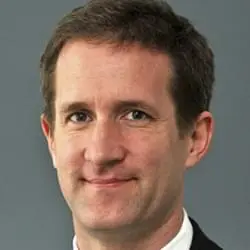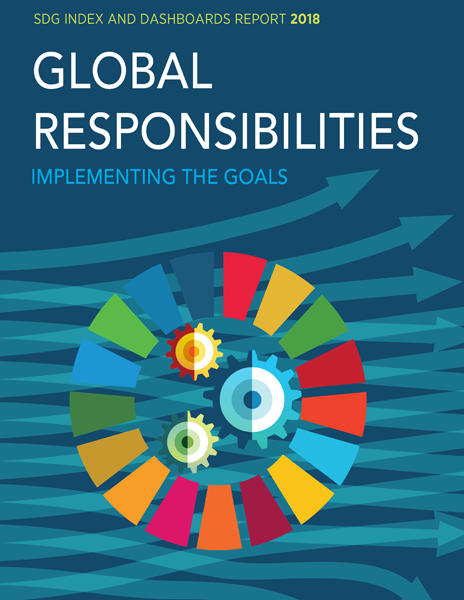More details
The SDG Index and Dashboards Report 2018 presents a revised and updated assessment of countries’ distance to achieving the Sustainable Development Goals (SDGs). It includes detailed SDG Dashboards to help identify implementation priorities for the SDGs. The report also provides a ranking of countries by the aggregate SDG Index of overall performance.
This year’s report includes several improvements and additions in comparison to previous versions. It incorporates trend data for the first time. New indicators have been added to cover more accurately the SDGs and associated targets with a special focus on “leave no one behind” for OECD member states. We present data for all 193 UN member states and estimate absolute SDG achievement gaps to complement per capita estimates. Building on the 2017 report, we expand the analysis of international SDG spillovers and present an overall SDG spillover index.
Executive Summary
Global findings
This year, three Nordic countries, Sweden, Denmark, and Finland, top the global SDG Index ranking, yet all three still face major challenges in achieving the SDGs. Due to several changes in indicators and some adjustments in the methodology, the results from the 2018 SDG Index and Dashboard are not comparable to the 2017 results. In particular, changes in country scores or rankings cannot be interpreted as SDG progress or regress since last year.
The SDG Index and Dashboards Report 2018 generates six additional findings:
Most G20 countries have started SDGs implementation, but important gaps remain.
Results from the novel survey on national SDG implementation mechanisms conducted by the SDSN and the Bertelsmann Stiftung show large variations among G20 countries in how the SDGs are embraced by the political leadership and translated into institutional mechanisms. Some countries have established dedicated coordination units, strategies and action plans, and accountability systems, while others lag behind on some or all of these dimensions. More data and analyses are needed to gauge the level of ambition and effectiveness of SDG strategies, tools, and processes.
No country is on track towards achieving all SDGs.
For the first time, we are able to show that no country is on track to achieve all the goals by 2030. For example, Sweden, Denmark, and Finland top the 2018 SDG Index, but they need to significantly accelerate progress towards achieving some goals, including Goal 12 (Sustainable Consumption and Production) and Goal 13 (Climate Action).
Conflicts are leading to reversals in SDG progress.
Most developing countries have experienced significant progress towards ending extreme poverty in all its forms, including income poverty, undernourishment, access to health and education services, and access to basic infrastructure. Achievement gaps are greatest towards universal completion of secondary education. Countries experiencing conflict have experienced some of the sharpest reversals, particularly towards achieving Goal 1 (No Poverty) and Goal 2 (No Hunger).
Progress towards sustainable consumption and production patterns is too slow.
High-income countries obtain their lowest scores on Goal 12 (Sustainable Consumption and Production) and Goal 14 (Life Below Water). While no trend data are available for Goal 12, the data for Goal 14 suggest that most of high-income countries have made no progress in recent years towards achieving the Goal. Trends on Goal 15 (Life on Land) are also insufficient. They show that further efforts are needed to protect the biodiversity and support sustainable production and consumption.
High-income countries generate negative SDG spillover effects.
High-income countries generate significant environmental, economic, and security spillover effects that undermine other countries’ efforts to achieve the SDGs. Yet, there is high variation in spillovers among countries with a similar per capita income. This suggests that countries can reduce their negative spillover effects without reducing their per capita incomes. Inequalities in economic and social outcomes require better data.
Newly added indicators for OECD countries focusing on inequalities in economic, health, and education outcomes lower the SDG Index scores for some countries. This suggests significant shortfalls in ensuring that no one is left behind, which are hidden by aggregate data. Such disaggregated data are unavailable for most non-OECD countries, so greater investments are needed to fill these data gaps.
About the Authors
Prof. Jeffrey Sachs
Director, SDSN; Project Director of the SDG Index

Jeffrey D. Sachs is a world-renowned professor of economics, leader in sustainable development, senior UN advisor, bestselling author, and syndicated columnist whose monthly newspaper columns appear in more than 100 countries. He is the co-recipient of the 2015 Blue Planet Prize, the leading global prize for environmental leadership, and many other international awards and honors. He has twice been named among Time magazine’s 100 most influential world leaders. He was called by the New York Times, “probably the most important economist in the world,” and by Time magazine, “the world’s best known economist.” A survey by The Economist in 2011 ranked Professor Sachs as amongst the world’s three most influential living economists of the first decade of the 21st century.
Professor Sachs serves as the Director of the Center for Sustainable Development at Columbia University. He is University Professor at Columbia University, the university’s highest academic rank. During 2002 to 2016 he served as the Director of the Earth Institute. Sachs is Special Advisor to United Nations Secretary-General António Guterres on the Sustainable Development Goals, and previously advised UN Secretary-General Ban Ki-moon on both the Sustainable Development Goals and Millennium Development Goals and UN Secretary-General Kofi Annan on the Millennium Development Goals.
Dr. Christian Kroll
Senior Expert, Bertelsmann Stiftung; Scientific Co-Director of the SDG Index

Dr. Christian Kroll is Scientific Co-Director of the SDG Index, and Senior Expert for Sustainable Development at Bertelsmann Stiftung. He gained a PhD from the London School of Economics with a thesis entitled “Towards a Sociology of Happiness” and authored articles in scientific journals spanning several disciplines, as well as numerous policy-oriented reports. His publication “Sustainable Development Goals: Are the rich countries ready” with a foreword by Kofi Annan featured the prototype SDG Index (for OECD countries). Christian is a Guest Lecturer at the Hertie School of Governance in Berlin where he developed the country’s first university course on the SDGs. Previously, he taught at the LSE and held academic positions at the Harvard Kennedy School of Government as well as Jacobs University. His research was featured by national and international media such as the Harvard Business Review, Washington Post, Le Monde, Die Zeit, ARD, Spiegel Online and others. Christian was honored as a Young Global Leader by the World Economic Forum.
Contact: Email / Twitter / Web
Dr. Guido Schmidt-Traub
Executive Director of SDSN; Scientific Co-Director of the SDG Index

Dr. Guido Schmidt-Traub is Scientific Co-Director of the SDG Index, and Executive Director of the UN Sustainable Development Solutions Network. He serves on the Governing Council of Future Earth and other advisory bodies. Previously, Guido was CEO of Paris-based CDC Climat Asset Management; climate change advisor to the Africa Progress Panel secretariat; and Director and Partner at South Pole Carbon Asset Management in Zurich. He managed the MDG Support Team at UNDP (2006-2008) and served as Policy Advisor and then as Associate Director of the UN Millennium Project in New York, which was tasked with developing an action plan to achieve the Millennium Development Goals and advised countries around the world on their implementation. Guido holds a Ph.D. in Economics from Wageningen University & Research, an M.Phil. in Economics from Oxford University (Rhodes Scholar), and a Masters in physical chemistry from the Free University Berlin.
Guillaume Lafortune
Manager, SDG Index, Paris

Guillaume Lafortune is the SDG Index Manager of the UN Sustainable Development Solutions Network. He has served as an economist at the Organisation for Economic Co-operation and Development (OECD) working on public governance reforms and statistics. He was one of the lead advisors for the production of the 2015 and 2017 flagship statistical report Government at a Glance. He also contributed to analytical work related to public sector efficiency, open government data and citizens’ satisfaction with public services. Earlier, Guillaume worked as an economist at the Ministry of Economic Development in the Government of Quebec (Canada). Guillaume holds a M.Sc in public administration from the National School of Public Administration (ENAP) in Montreal and a B.Sc in international economics from the University of Montreal.
Contact: Email
Grayson Fuller
Analyst, Paris

Grayson Fuller joined the Paris Secretariat as the SDG Index Analyst. His role consists of managing the data, coding, and statistical analyses for the SDG Index and Dashboards report. He additionally carries out research related to sustainable development. Grayson received his Masters degree in Economic Development at Sciences Po Paris. He holds a Bachelors in Latin American Studies from Harvard University, where he graduated cum laude. Grayson has lived in several Latin American countries and speaks English, Spanish, French, Portuguese, and Russian. He enjoys playing violin and hails from Atlanta, GA.
Contact: Email
Acknowledgements
Guillaume Lafortune coordinated the production of the report under the direction of Guido Schmidt-Traub and Christian Kroll and under the overall supervision of Jeffrey Sachs. Grayson Fuller was responsible for the data collection and management.
Publication design and layout by Pica Publishing.
